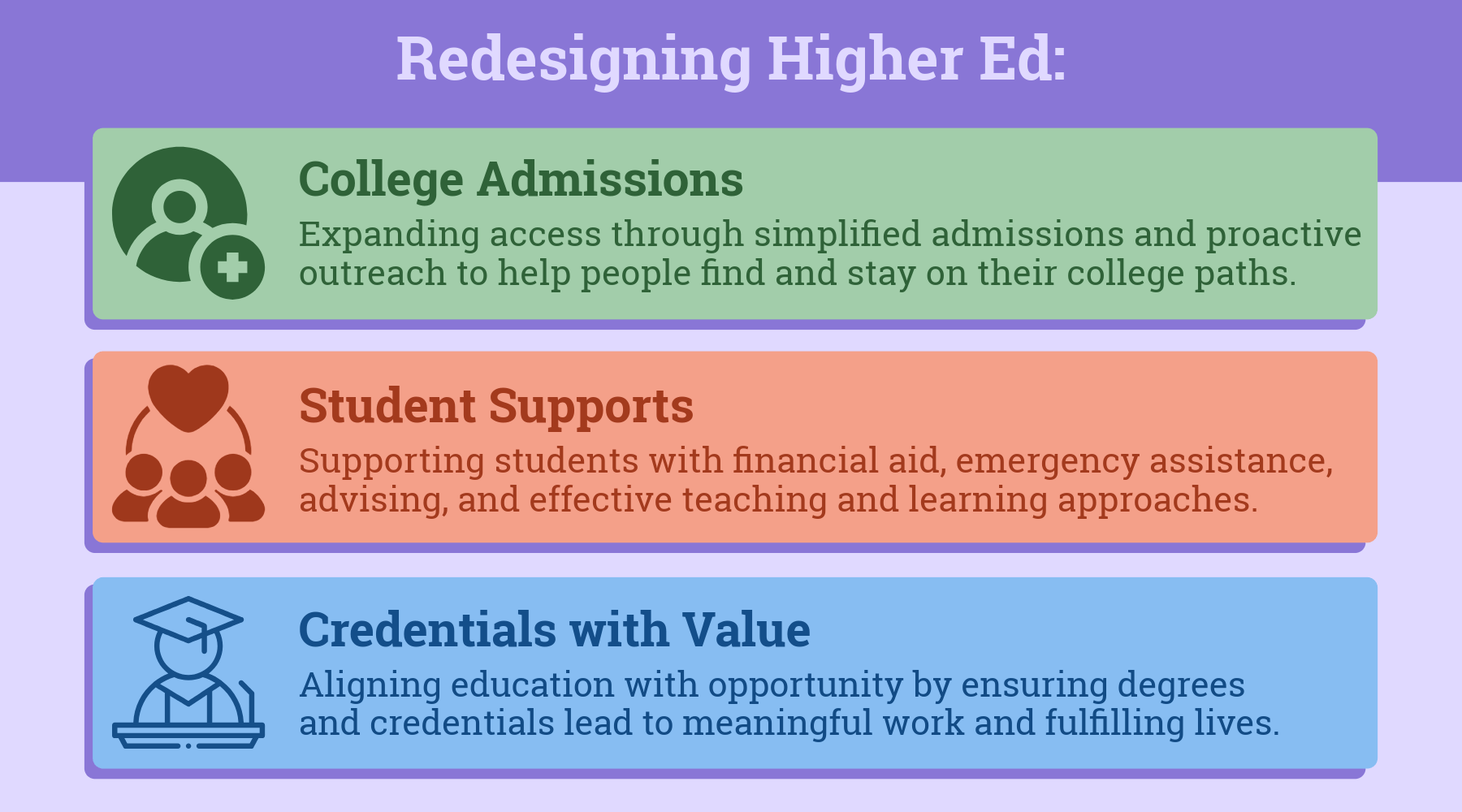Redesigning College Admissions
We work with states, higher education systems, and colleges and universities to transform how potential students apply, enroll, and access their institutions.
America’s colleges and universities are at a crossroads. Although many people still see the value of higher education, many others are losing confidence, viewing it as too expensive or disconnected from real-world opportunities. At the same time, our economy demands a skilled workforce, equipped with the capabilities to adapt, contribute, and thrive.
Enrollment is falling, and tens of millions of adults have some college credit but no degree. This is because today’s students are often adults balancing work, family, and education, and many face obstacles like unstable housing, limited childcare, and mental health struggles. Colleges were not built for these students, and the systems need to be boldly redesigned to meet their needs.
Lumina is helping lead this transformation. We work with public and private colleges and universities, community colleges, and minority-serving institutions to create pathways to meaningful credentials, particularly for working adults. This transformation focuses on offering relevant courses, using data to improve outcomes, and providing flexible learning formats. Through this work, we hope to support individual success, strengthen communities, and create a more prosperous nation.

Navigating college should be easy, but for many—especially first-time applicants, working adults, or those returning to finish degrees—the process can be overwhelming or discouraging. With our partners, we’re working to simplify admissions and expand outreach to historically overlooked students, helping them to find their path to college and stay on it.
Many two-year institutions expect students to find their own way in, which leaves too many people behind. We support strategies that help community colleges:
More than 43 million Americans have earned some college credit but never earned their degree. Many want to return but face barriers that make re-enrolling difficult or confusing. We’re working to:
One barrier is the Satisfactory Academic Progress rule. This federal policy cuts off financial aid for students who don’t meet academic standards for two consecutive terms, even when the reason is a personal crisis such as the death of a loved one. This disproportionately affects students from underserved backgrounds and makes returning to college nearly impossible for many.
We support efforts to:
Many of today’s students face challenges both in the classroom and far beyond the classroom, such as finding food, transportation, or childcare. Millions of students, especially adults, first-generation students, and students of color, need more than academic support. We work with colleges and states to create systems that help students get the financial, academic, and personal support they need to succeed. These systems include financial aid that goes further, more helpful advising, and policies that make college more accessible.
Demand for short-term credentials in healthcare, logistics, and advanced manufacturing is growing. But the financial aid system hasn’t kept up. Pell Grants don’t cover many non-credit programs, making it difficult for students from low-income households to afford these rapid, workforce-focused pathways. And support services such as advising, transportation, or childcare are often disconnected from these training programs, especially when they operate outside a college’s main structure. Lumina is advancing efforts to bridge these gaps by:
At colleges and universities with a focus on bachelor’s programs, bureaucratic hurdles often stand in the way. The college application process can be overwhelming, and many students miss out on aid they’re eligible for simply because they don’t know it exists or how to apply.
Lumina supports:
Lumina is helping colleges and universities deliver degrees and other credentials that hold value in the workplace and the future of our economy. To meet Lumina’s new goal for 2040—ensuring that 75 percent of adults in the U.S. labor force have college degrees or other credentials with value—we must redefine what “value” truly means.
Credentials of value open doors to good jobs, long-term economic mobility, and the durable skills to succeed in work and life. Lumina is working with public and private bachelor’s-granting colleges and universities nationwide to ensure that all students, especially those historically underserved, can earn credentials that deliver real and lasting economic returns.
Community and technical colleges are key to reaching more adults with short-term credentials and associate degrees that reflect real workforce needs. Lumina’s efforts are part of a broader attempt to elevate community colleges’ role as engines of mobility and inclusion in the U.S. workforce. These efforts include:
Bachelor’s degrees remain a powerful tool for achieving economic prosperity, but they must evolve to meet students’ and employers’ changing needs. Lumina is working with public and private colleges and universities to make the bachelor’s degree more workforce-relevant, accessible, and valuable for all students—not just those with traditional access and resources. We aim to:
To deliver on the promise of the 2040 goal, we need better tools to assess and ensure that all credentials truly lead to economic opportunity. That means going beyond narrow wage comparisons to understand broader dimensions of value. Lumina is:
Reaching 75 percent by 2040 will require a bold transformation of how we define and deliver higher education and workforce training in this country. We are committed to working with community colleges and public universities to build systems where all learning counts—and where every student can earn a credential that leads to lasting prosperity.